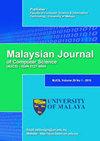A TRACE CLUSTERING FRAMEWORK FOR IMPROVING THE BEHAVIORAL AND STRUCTURAL QUALITY OF PROCESS MODELS IN PROCESS MINING
IF 1.2
4区 计算机科学
Q4 COMPUTER SCIENCE, ARTIFICIAL INTELLIGENCE
引用次数: 0
Abstract
Process mining (PM) techniques are increasingly used to enhance operational procedures. However, applying PM to unstructured processes can result in complex process models that are difficult to interpret. Trace clustering is the most prevalent method for handling this complexity, but it has limitations in dealing with event logs that contain many activities with varied behaviours. In such cases, trace clustering can produce inaccurate process models that are expensive in terms of time performance. Therefore, it is crucial to develop a trace clustering solution that is optimal in terms of behavioural and structural quality of process models while being efficient in terms of time performance. In this study, we introduce a refined trace clustering framework with an integration of log abstraction and decomposition technique that improves the precision of process models by 38%, leading to a 40% increase in the f-score. The proposed framework also produces process models that are 38% simpler than those produced by baseline approaches. More importantly, our framework achieves a remarkable 89% improvement in time performance, making it a valuable contribution to the field of process mining. Future works include exploring the scalability of the proposed framework against a wider range of complex event logs and testing the framework to validate its effectiveness in practical applications.一种用于提高过程挖掘中过程模型的行为和结构质量的跟踪聚类框架
过程挖掘(PM)技术越来越多地用于增强操作程序。然而,将项目管理应用于非结构化过程可能导致难以解释的复杂过程模型。跟踪集群是处理这种复杂性的最流行的方法,但是它在处理包含许多具有不同行为的活动的事件日志方面有局限性。在这种情况下,跟踪聚类可能产生不准确的流程模型,在时间性能方面代价高昂。因此,开发跟踪聚类解决方案至关重要,该解决方案在过程模型的行为和结构质量方面是最佳的,同时在时间性能方面是有效的。在这项研究中,我们引入了一个精细的跟踪聚类框架,该框架集成了日志抽象和分解技术,将过程模型的精度提高了38%,从而使f分数提高了40%。提议的框架还产生了比基线方法产生的过程模型简单38%的过程模型。更重要的是,我们的框架在时间性能上实现了89%的显著提高,使其对过程挖掘领域做出了宝贵的贡献。未来的工作包括针对更大范围的复杂事件日志探索所提出的框架的可伸缩性,并测试框架以验证其在实际应用中的有效性。
本文章由计算机程序翻译,如有差异,请以英文原文为准。
求助全文
约1分钟内获得全文
求助全文
来源期刊

Malaysian Journal of Computer Science
COMPUTER SCIENCE, ARTIFICIAL INTELLIGENCE-COMPUTER SCIENCE, THEORY & METHODS
CiteScore
2.20
自引率
33.30%
发文量
35
审稿时长
7.5 months
期刊介绍:
The Malaysian Journal of Computer Science (ISSN 0127-9084) is published four times a year in January, April, July and October by the Faculty of Computer Science and Information Technology, University of Malaya, since 1985. Over the years, the journal has gained popularity and the number of paper submissions has increased steadily. The rigorous reviews from the referees have helped in ensuring that the high standard of the journal is maintained. The objectives are to promote exchange of information and knowledge in research work, new inventions/developments of Computer Science and on the use of Information Technology towards the structuring of an information-rich society and to assist the academic staff from local and foreign universities, business and industrial sectors, government departments and academic institutions on publishing research results and studies in Computer Science and Information Technology through a scholarly publication. The journal is being indexed and abstracted by Clarivate Analytics'' Web of Science and Elsevier''s Scopus
 求助内容:
求助内容: 应助结果提醒方式:
应助结果提醒方式:


